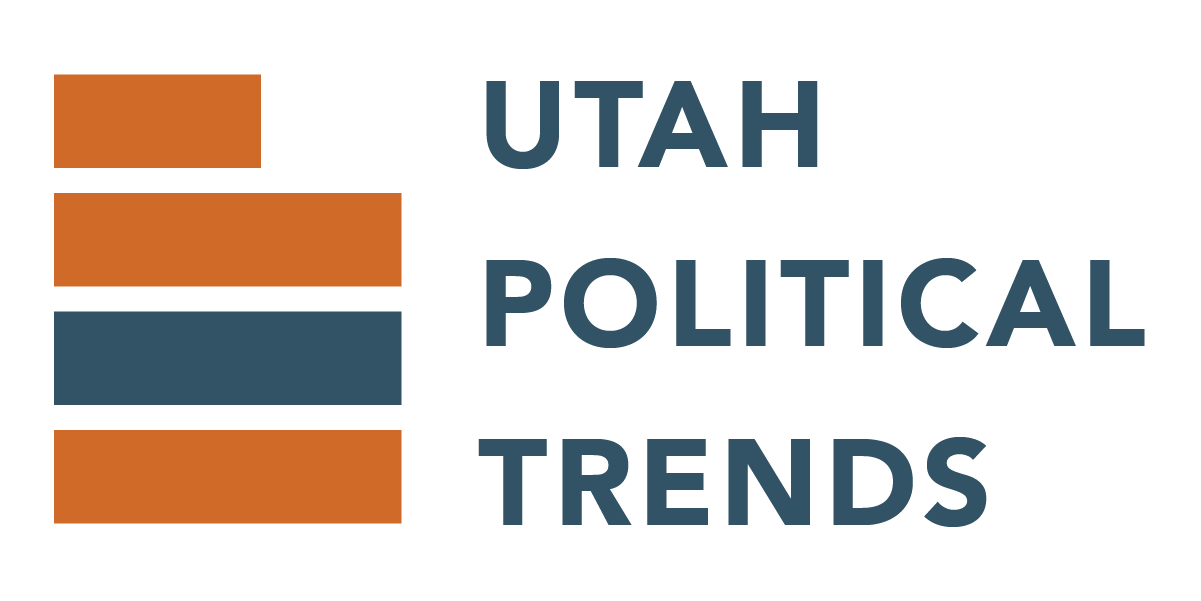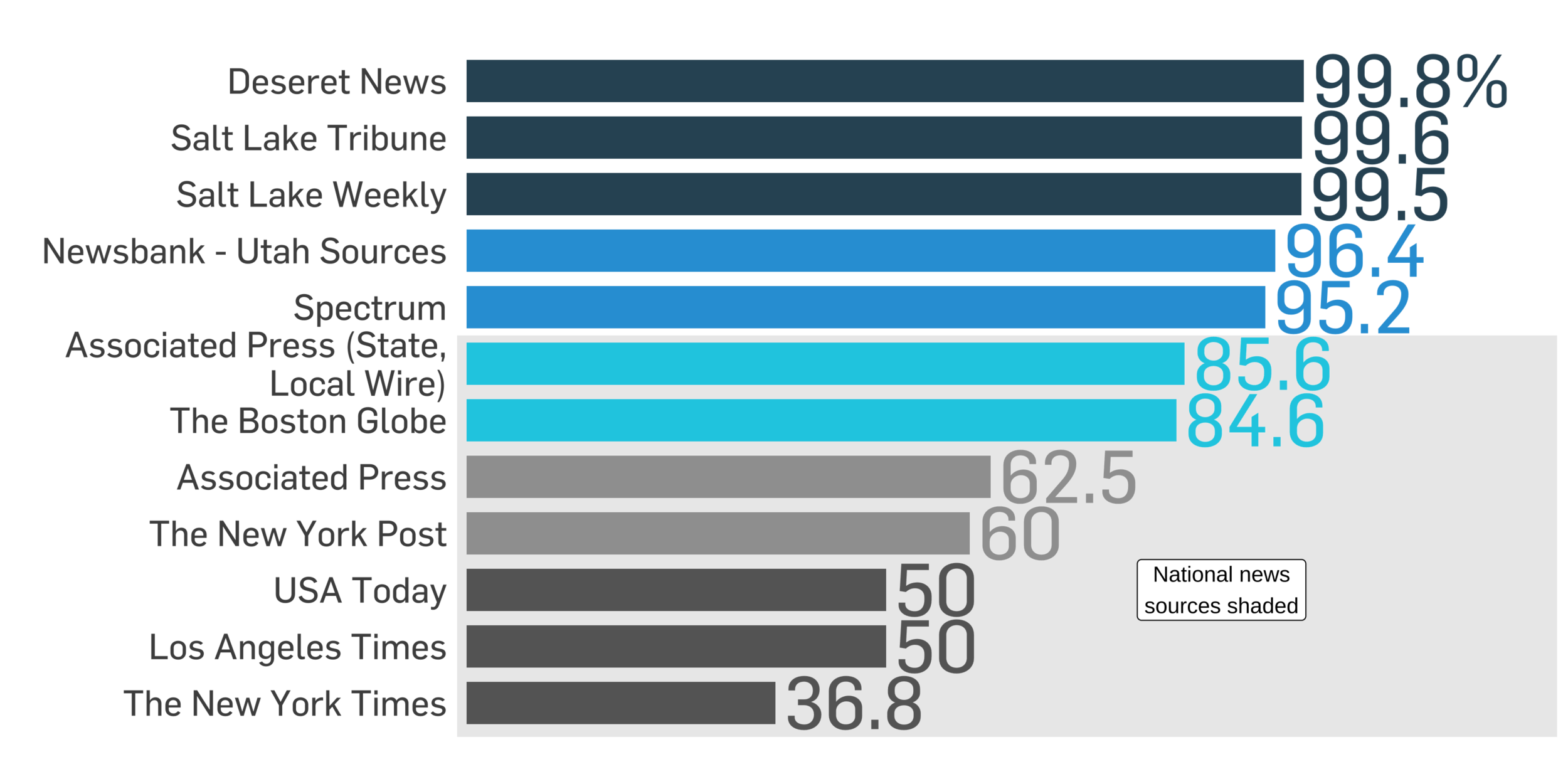By Quin Monson, Partner at Y2 Analytics
“Demonym” is the ten-dollar word used to refer to the people that live in a particular country, state, city, etc. According to Wikipedia, the people of Georgia are Georgians, the people of New Hampshire are New Hampshirites, and the people of Indiana are Hoosiers (not Indianian, that’s now “archaic”). What about the people of Utah? Wikipedia says the correct answer is Utahn. No alternate or unofficial version is offered.
The people of Utah (hereafter Utahns), unlike the Associated Press or the New York Times (more on that below), also know the correct answer to this question. In a recent statewide survey of Utah voters fielded from June 24 to July 7, 2021 respondents were asked, “Which of the following do you think is the correct way to spell the word that refers to someone who lives in Utah?” Only two options were given, and “Utahn” was chosen by 90%, an overwhelming majority by any standard.
UTAHN IS THE ONLY ACCEPTABLE DEMONYM
Every large group has a few contrarians, so any public opinion item with 90% agreement is rare. That’s probably higher than the proportion of Utahns that consider themselves fans of the Utah Jazz or that listen to the Tabernacle Choir at Temple Square. In the same survey we asked Utahns “How much do you approve or disapprove of Pioneer Day/July 24th being an official Utah state holiday?” Even a state holiday receives a smaller proportion of agreement (“Only” 84% ) than the proportion selecting Utahn as the correct spelling.
A large plurality of Utahns also believe that “Utahn” is the only acceptable demonym. We used the answer to the first question to present a follow up question. If a respondent answered “Utahn” to the first question, they were then asked, “Given your response that ‘Utahn’ is correct, do you also think it is acceptable to use ‘Utahan’ or not? When the responses to the two questions are combined, a plurality of Utahns not only know the correct spelling but see the alternative as unacceptable. Conversely, only 2% of Utahns prefer the incorrect spelling and see the alternative as unacceptable. The locals clearly prefer one spelling over the other.
CLEAR PREFERENCE AMONG ALL GROUPS
What predicts this preference? It is hard to predict something that does not show much variability, so we will pose the question in a slightly different way. Overwhelming majorities of Democrats and Republicans, Biden voters and Trump voters, as well as Cox voters and Peterson voters agree that Utahn is correct. These are groups that normally see the world differently. They not only cannot agree on who to vote for in an election, but many cannot even agree on who won the 2020 presidential election or if election fraud occurred during that election. Given the long-term religious and cultural divide in Utah, you might expect some differences on the preferred demonym by religion. That expectation would be incorrect. Whether you are a Latter-day Saint, some other religion, or no religion at all, you prefer to call yourself a “Utahn”.
TRENDS IN PUBLICATIONS
Does anything predict a preference for Utahn? The differences are not large, and it is hard to improve on 90% agreement, but if a survey respondent reports being “originally from Utah” she shows an even stronger preference for “Utahn.” The same is true for those who have lived here at least 5 years or more.
Why do we care about the spelling? Standards of journalism suggest that the correct demonym should follow local preferences and local usage. The poll clearly establishes the local preference. But what about usage? We used the Lexis/Nexis database of news stories from 2000 through 2020 to search for both terms and computed the percentage of the time that each news media used the correct spelling. There are separate listings for the Deseret News, the Salt Lake Tribune, the Salt Lake City Weekly, and the St. George Spectrum. “Newsbank” represents a combination of other local news sources.
Every single local news source’s use of “Utahn” is above 95%. The Salt Lake Tribune and Deseret News, both with long and deep roots in the state and with very different histories and editorial priorities, are both at nearly 100%. In fact, we dug around a bit to find out when these two papers would allow an incorrect spelling to go to press. The answer is that the incorrect spelling only occurs in letters to the editor (which are not corrected) and when used by a snarky columnist to poke fun at some outsider’s incorrect spelling.
The national press is quite uneven. The Associated Press state and local wire service gets the spelling correct most of the time and someone at the Boston Globe is clearly on top of things, but after that it gets sketchy. The Associated Press apparently allows both spellings, but at least uses the correct one most of the time in national wire service stories. USA Today and the Los Angeles Times appear to be flipping a coin (or at least alternating between the two evenly). The New York Times, the national paper of record, finds itself underwater on this metric. [note: we also wanted to include the Washington Post, but they had a dispute with Lexis/Nexis and the data are not available].
To add to this growing list of evidence, we looked at the use of Utahn vs Utahan in books. Using data obtained from Google Ngram Viewer and Google Books database, we clearly see that Utahn is the preferred spelling in books for all but a small portion of Utah’s history (the ‘60s truly were a wild time).
CONCLUSION
What should be done? First, clearly the national news media need to conform their standards to local preference and usage. We urge them to update their style guides to reflect local preference and usage. Besides Wikipedia, the US Government Printing Office (setting the standard for the entire Federal Government), the Utah Education Association, Salt Lake School District, Utah State University all stipulate the spelling preferred by Utahns.
Second, some Utah institutions need to get on board and standardize. Brigham Young University does not have a preference listed in their style guide, although the Daily Universe at BYU clearly shows a preference for Utahn with their “supplement to the AP Stylebook”. The University of Utah and Weber State could update their style guides too.
More importantly, the state of Utah, unlike the federal government, does not present a clear standard either. Given the ideological proclivity of Utahns to resist federal encroachments, perhaps leaders should pursue an executive order or even a new law declaring an official state demonym. We have an official tree, bird, rock, firearm, and dinosaur. Utah recently entertained a proposal to update and beautify the state flag. The state needs an official demonym, whether by executive decree or in the next legislative session (why not both?).
Finally, national news media outlets need to update their style guides, starting with the Associated Press Stylebook, to follow journalism norms so that the clear local preference for “Utahn” by Utahns becomes the standard everywhere.
The margin of error for these results is 4.8 percentage points (resulting from a sample size of 415 survey respondents and a target population of 1.5 million registered Utah voters). For full survey methodology details and topline frequencies, click here.
Bonus Content
We took to the streets of Salt Lake City to ask people face-to-face what they thought. Most of the people we interviewed were not originally from Utah. They gave a variety of different answers and spellings, demonstrating the need for uniformity.







